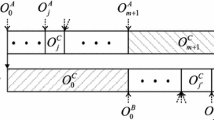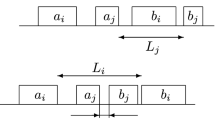Abstract
Job precedence can be found in some real-life situations. For the application in the scheduling of patients from multiple waiting lines or different physicians, patients in the same waiting line for scarce resources such as organs, or with the same physician often need to be treated on the first-come, first-served basis to avoid ethical or legal issues, and precedence constraints can restrict their treatment sequence. In view of this observation, this paper considers a two-machine flowshop scheduling problem with precedence constraint on two jobs with the goal to find a sequence that minimizes the total tardiness criterion. In searching solutions to this problem, we build a branch-and-bound method incorporating several dominances and a lower bound to find an optimal solution. In addition, we also develop a genetic and larger-order-value method to find a near-optimal solution. Finally, we conduct the computational experiments to evaluate the performances of all the proposed algorithms.



Similar content being viewed by others
References
Armentano VA, Ronconi DP (1999) Tabu search for total tardiness minimization in flow-shop scheduling problems. Comput Oper Res 26:219–235
Baker KR (1974) Introduction to sequencing and scheduling. Wiley, New York
Bank M, Fatemi Ghomi SMT, Jolai F, Behnamian J (2012) Two-machine flow shop total tardiness scheduling problem with deteriorating jobs. Appl Math Model 36(11):5418–5426
Bean JC (1994) Genetic algorithms and random keys for sequencing and optimization. ORSA J Comput 6:154–160
Chandra C, Liu Z, He J, Ruohonen T (2014) A binary branch and bound algorithm to minimize maximum scheduling cost. Omega 42:9–15
Chen ZY, Tsai CF, Eberle W, Lin WC, Ke W-C (2014) Instance selection by genetic-based biological algorithm. Soft Comput. doi:10.1007/s00500-014-1339-0
Chen P, Wu C-C, Lee WC (2006) A bi-criteria two-machine flowshop scheduling problem with a learning effect. J Oper Res Soc 57:1113–1125
Chung CS, Flynn J, Kirca O (2006) A branch and bound algorithm to minimize the total tardiness for m-machine permutation flowshop problems. Eur J Oper Res 174:1–10
Della Croce F, Narayan V, Tadei R (1996) The two-machine total completion time flow shop problem. Eur J Oper Res 90:227–237
Essafi I, Mati Y, Dauzere-Peres S (2008) A genetic local search algorithm for minimizing total weighted tardiness in the job-shop scheduling problem. Comput Oper Res 35:2599–2616
Etiler O, Toklu B, Atak M, Wilson J (2004) A generic algorithm for flow shop scheduling problems. J Oper Res Soc 55(8):830–835
Fisher ML (1971) A dual algorithm for the one-machine scheduling problem. Math Program 11:229–251
French S (1982) Sequencing and scheduling: an introduction to the mathematics of the job shop. British Library Cataloguing in Publish Data, Ellis Horwood Limited, Chichester
Gao KZ, Li H, Pan QK, Li JQ, Liang JJ (2010) Hybrid heuristics based on harmony search to minimize total flow time in no-wait flow shop. Control and decision conference (CCDC), 2010 Chinese. IEEE, 2010
Garey MR, Johnson DS, Sethi PR (1979) The complexity of flowshop and jobshop scheduling. Math Oper Res 1:117–129
Gelders LF, Sambandam N (1978) Four simple heuristics for scheduling a flowshop. Int J Prod Res 16:221–231
Gen M, Lin L (2012) Multiobjective genetic algorithm for scheduling problems in manufacturing systems. Ind Eng Manag Syst 11:310–330
Gong D, Wang G, Sun X, Han Y (2014) A set-based genetic algorithm for solving the many-objective optimization problem. Soft Comput. doi:10.1007/s00500-014-1284-y
Ishibuchi H, Murata T (1998) A multi-objective genetic local search algorithm and its application to flowshop scheduling. IEEE Trans Syst Man Cybern-Part C: Appl Rev 28(3):392–403
Kharbeche M, Haouari M (2013) MIP models for minimizing total tardiness in a two-machine flow shop. J Oper Res Soc 64:690–707
Kim Y-D (1993) A new branch and bound algorithm for minimizing mean tardiness in two-machine flowshops. Comput Oper Res 20:391–401
Kim Y-D (1995) Minimizing total tardiness in permutation flowshops. Eur J Oper Res 85(3):541–555
Koulamas C (1994) The total tardiness problem: review and extensions. Oper Res 42:1025–1041
Lenstra JK, Rinnooy AHG, Brucker P (1977) Complexity of machine scheduling problems. Ann Discrete Math 1:1016–1019
Li J, Song Y (2013) Community detection in complex networks using extended compact genetic algorithm. Soft Comput 17(6):925–937
Mati Y, Xie X (2008) A genetic-search-guided greedy algorithm for multi-resource shop scheduling with resource flexibility. IIE Trans 40(12):1228–1240
Onwubolu GC, Mutingi M (1999) Genetic algorithm for minimizing tardiness in flow-shop scheduling. Prod Plan Control 10:462–471
Ow PS (1985) Focused scheduling in proportionate flowshops. Manag Sci 31:852–869
Pan JCH, Chen J-S, Chao C-M (2002) Minimizing tardiness in a two-machine flow-shop. Comput Oper Res 29:869–885
Pan JCH, Fan E-T (1997) Two-machine flowshop scheduling to minimize total tardiness. Int J Syst Sci 28(4):405–414
Panwalker SS, Iskander W (1977) A survey of scheduling rules. Oper Res 25:45–61
Parthasarathy S, Rajendran C (1997) A simulated annealing heuristic for scheduling to minimize mean weighted tardiness in a flowshop with sequence dependent setup times of jobs-a case study. Prod Plan Control 8:475–483
Pinedo M (2008) Scheduling: theory, algorithms and systems. Upper Saddle River, Prentice-Hall
Qian B, Wang L, Huang D-X, Wang W-L, Wang X (2009) An effective hybrid DE-based algorithm for multi-objective flow shop scheduling with limited buffers. Comput Oper Res 36(1):209–233
Reeves C (1995) Heuristics for scheduling a single machine subject to unequal job release times. Eur J Oper Res 80:397–403
Schaller J (2005) Note on minimizing total tardiness in a two-machine flowshop. Comput Oper Res 32(12):3273–3281
Sen T, Dileepan P, Gupta JND (1989) The two-machine flowshop scheduling problem with total tardiness. Comput Oper Res 16:333–340
Storn R, Price K (1997) Differential evolution—a simple and efficient heuristic for global optimization over continuous spaces. J Glob Optim 11(4):341–359
Ta QC, Billaut J-C, Bouquard J- L (2013) An hybrid metaheuristic, an hybrid lower bound and a Tabu search for the two-machine flowshop total tardiness problem. 2013 IEEE RIVF international conference on computing & communication technologies—research, innovation, and vision for the future (RIVF), pp 198–202
Tasgetiren MF, Liang YC, Sevkli M, Gencyilmaz G (2004) Differential evolution algorithm for permutation flowshop sequencing problem with makespan criterion. In: Proceedings of 4th international symposium on intelligent manufacturing systems, Sakarya, Turkey, 2004
Vallada E, Ruiz R, Minella G (2008) Minimising total tardiness in the \(m\)-machine flowshop problem: a review and evaluation of heuristics and metaheuristics. Comput Oper Res 35(4):1350–1373
Wang L, Qian, B (2012) Hybrid differential evolution and scheduling algorithms. Beijing Tsinghua University Press. ISBN 978-7-302-28367-6 (in Chinese)
Wu C-C, Lee W-C, Wang W-C (2007) A two-machine flowshop maximum tardiness scheduling problem with a learning effect. Int J Adv Manuf Technol 31(7–8):743–750
Acknowledgments
We are grateful to the Editor and two anonymous referees for his/her constructive comments on the earlier versions of our paper. This paper was supported in part by the NSC of Taiwan under Grant Numbers NSC 102-2221-E-035-070-MY3 and MOST 103-2410-H-035-022-MY2; in part by the National Natural Science Foundation of China (71301022, 51304050); in part by the Natural Science Foundation of Jiangxi Province (20151BAB206030); in part by the Education Department of Jiangxi Province Science and Technology Plan Project (GJJ13445); and in part by the Personnel Training Fund of Kunming University of Science and Technology under Grant Number KKSY201407098.
Author information
Authors and Affiliations
Corresponding author
Ethics declarations
Conflict of interest
The authors declare that there is no conflict of interests regarding the publication of this paper.
Additional information
Communicated by V. Loia.
Rights and permissions
About this article
Cite this article
Cheng, SR., Yin, Y., Wen, CH. et al. A two-machine flowshop scheduling problem with precedence constraint on two jobs. Soft Comput 21, 2091–2103 (2017). https://doi.org/10.1007/s00500-015-1908-x
Published:
Issue Date:
DOI: https://doi.org/10.1007/s00500-015-1908-x




